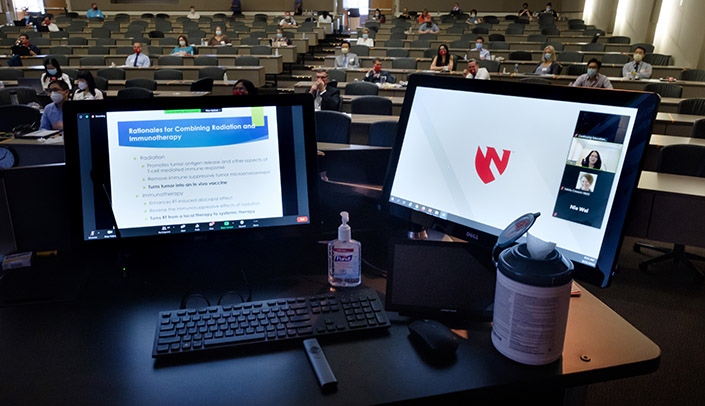From large gatherings to small events, the COVID-19 pandemic has altered the plans of numerous symposiums, conferences and fall back-to-school orientations. Many planned events were canceled, re-scheduled for a later date or moved entirely online.
The 2020 Midwest Radiation Oncology Symposium is a multidisciplinary accredited continuing education event that Chi Lin, MD, PhD, symposium director, and professor and vice chair of research in the department of radiation oncology at UNMC, was determined to offer yet this year.
Originally planned as a live symposium for April, the symposium was held Aug. 22-23 due to the COVID-19 pandemic, in a hybrid fashion to maximize safety and maintain the integrity of the symposium, said Jeannie Trichel, educational projects coordinator with the Center for Continuing Education at UNMC.
“The symposium was not just a great opportunity for UNMC faculty to connect and reconnect, but helped foster communication between radiation oncologists from across the U.S. and China and promote delivery of high-quality radiation therapy to cancer patients around the world,” Dr. Lin said.
The symposium provided all members of the interdisciplinary oncology team with education and training on recent advances in radiation oncology, physics and biology. It also covered the role of radiation therapy in multidisciplinary cancer care and provided up-to-date information to referring physicians seeking to transfer their patients to the oncology team.
“The planning of this symposium was truly a collaborative team effort between the radiation oncology department, Center for Continuing Education and the College of Nursing Continuing Nursing Education, and all professions involved will benefit from this activity,” Trichel said.
The Center for Continuing Education and the College of Nursing Continuing Nursing Education are available to help others seeking to hold a conference find ways to do so and encourage organizers to reach out to them, she said.
For this event and as a guide to others, organizers came up with a checklist of tips on how to plan an event like this. Tips include:
- For any activity with greater than 25 people, the Recovery Implementation Plan must be utilized (pages 18-22). A request must be submitted to the appropriate dean or director for approval before an activity can commence;
- Venue size and how many people can attend in-person to promote social distancing. This symposium was held in the Durham Research Center auditorium, which seats 319 people, but only 37 people attended in-person the day of the event;
- Practice with online presenters to work out any technological issues in advance;
- Make sure in-person participants and presenters have knowledge of all UNMC campus safety protocols as it pertains to COVID-19, (information about UNMC’s Recovery Implementation Plan can be found on the COVID-19 Resources website);
- Promote self-screening using the 1-Check COVID mobile app;
- Provide disposable name tags, hand sanitizer and face masks and box style meals;
- Communicate frequently with all participants and presenters; and
- Finally, contact both campus security and campus parking to inform them of your event.
“We had volunteers checking people in on the day of the event, and others monitoring the chat box so online participants are heard,” Trichel said.
“We felt we had an activity that met everyone’s needs, offered an educational activity that will enhance participants’ knowledge and did so in a safe manner,” Trichel said.
